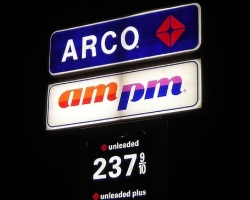Cancer has been on the minds of some Bridgeport residents since it became known last year that the soil under some of their homes had been contaminated with gasoline vapors.
The vapors were apparently the result of at least two leaks from the ARCO station on Pacific Coast Highway that have occurred since the 1980s.
A USC research on Wednesday, March 31, told Seal Beach’s Bridgeport residents there was no evidence they faced an increased risk of cancer due to the contamination from the gas station.
“Just say that the study’s in progress,” Dr. Wendy Cozen told the Sun Newspapers. Cozen is a USC researcher.
Cozen is a part-time epidemiologist with the Los Angeles County Cancer Surveillance Program. Cozen told the Sun Newspapers that she was called in to look at California Cancer Registry data for the Bridgeport neighborhood because state budget cuts had caused the elimination of the Orange County epidemiologist.
Bridgeport residents of the 25 homes nearest the ARCO gas station have been concerned about the possibility that they and their loved ones are at risk for cancer.
One of the chemical contaminants found in gasoline vapors is benzene—which is known to cause blood and bladder cancers.
Medically, cancer is abnormal cell reproduction in the body. There are more than 100 different kinds of cancer.
Cozen said there is no one cause for all cancers.
According to Bridgeport resident Robert Goldberg, a physician, who attended the Bridgeport community meeting last week, Dr. Wendy Cozen of the University of Southern California said she found no evidence that Bridgeport residents were at higher risk for developing a cancer.
“She compared the incident rate for the two cancers associated with benzene exposure (bladder cancer and blood cancer) in the census tract that includes Bridgeport versus Orange County,” Goldberg wrote in an e-mail to the Sun.
“This study showed that the local incident rates during 2000-2007 for these cancer types were exactly as expected,” Goldberg said.
In response to a request from the audience, Cozen agreed to look at California Cancer Registry data from 1990-1999.
Cozen told the Sun that she agreed with Bridgeport residents who thought the preliminary study covered too short a period of time.
However, Cozen pointed out that studying a neighborhood for cancer clusters didn’t necessarily tell anyone anything important.
“I wanted the community to know that we have problems with very small areas,” she said.
Cozen explained that finding—for a hypothetical example—one more instance of a cancer than the statistical average didn’t mean the cancer was caused by something in the area.
That problem was addressed in Dr. Thomas M. Mack’s book, “Cancers in the Urban Environment.”
“Because the actual number of cases in a neighborhood is usually small, it is rarely possible to make a definitive statement,” Mack wrote.
Dr. Mack, incidentally, is Dr. Cozen’s husband.
Another problem with the study was that not all cancers have the same cause, so she limited her study to bladder and blood cancers.
Cozen said that breast and prostate cancers, for example, are hormone-related.
Benzene is strongly linked to some forms of leukemia, a blood cancer.
Cozen said the fact that people have observed too much cancer in a particular neighborhood doesn’t prove anything either.
“We never get calls from people saying there’s too little cancer,” she said.
The fact people have been diagnosed with cancer does not mean the cause is in their community.
“A third of us will get cancer,” she said. Cozen was reluctant to say when her study would be complete.
However, she did say that the contamination in the Bridgeport neighborhood needed to be removed—regardless of the cancer risk to residents.
Cozen did not feel qualified to comment on the subject of decontaminating the area.
Corrective Action Plan update
In related news, Anthony Martinez from the Orange County Health Care Agency told Bridgeport residents that he had received 50 letters and e-mails commenting on the Atlantic Richfield Company/British Petroleum proposals for cleaning up the ARCO station site.
He also said he had received 25 oral comments on the preliminary Corrective Action Plan.
The county is expected to ask ARCO for a final draft at the end of May.
Justin Hawkins, a representative of Stantec, the consulting firm hired by ARCO, said Stantec is going to perform pilot studies on the four possible clean up approaches proposed in the CAP.




